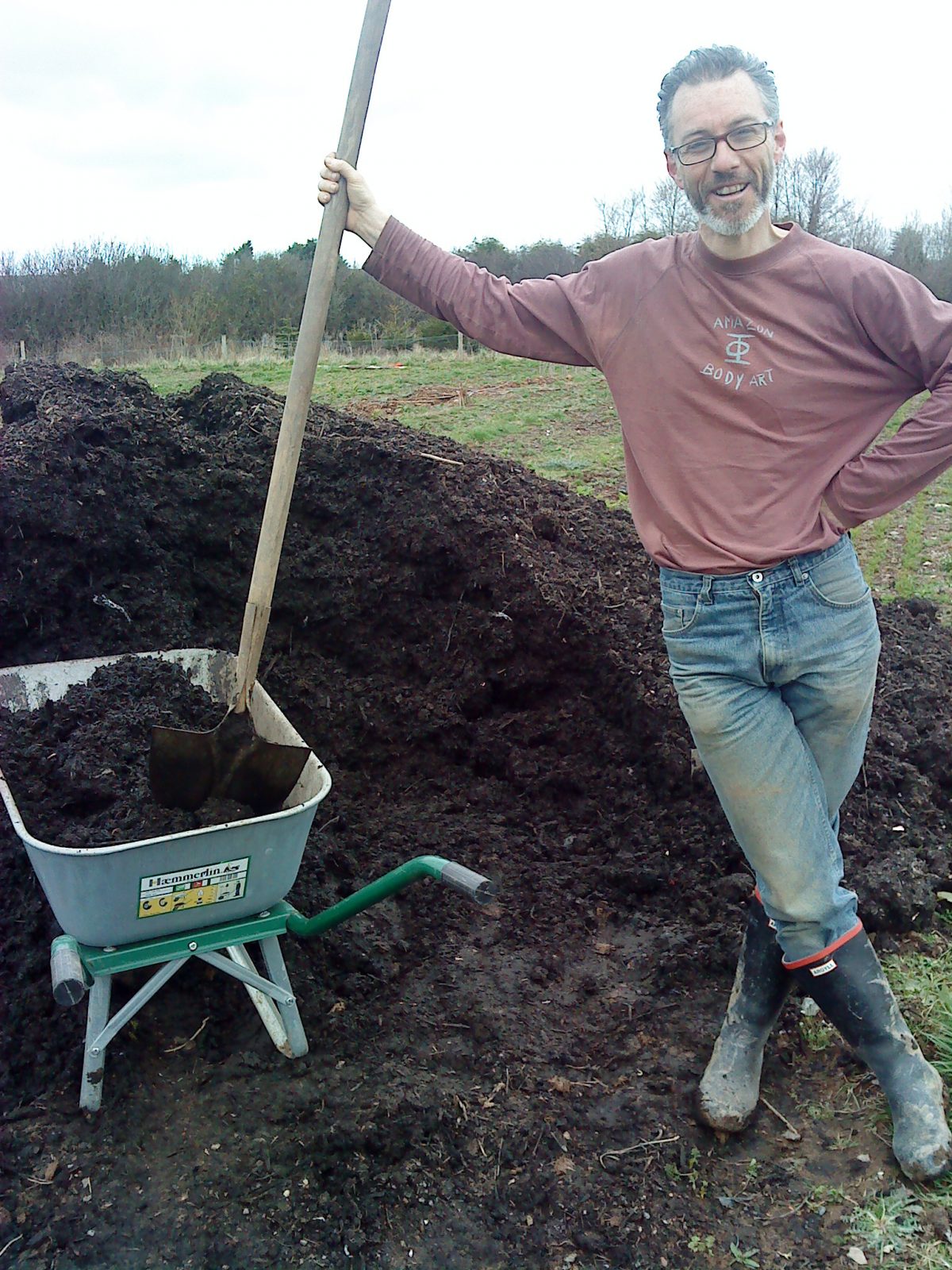
April 10, 2010
Make the most of this lovely spring weather. Come and share in the push to get our vegetables in the ground. There’s lots to do.
We need plenty of people at our volunteer growing session this Sunday 11 April to prepare some more beds and spread compost. There’s also celery and broad beans to plant out as well as beetroot and parsnip seeds to sow.
Please join us between 10am and 1pm on Sunday. You’ll find us on the plot behind St Kew Harvest Farm Shop. If you can, bring tools – hoes, spades, forks, trowels, rakes, wheelbarrows.
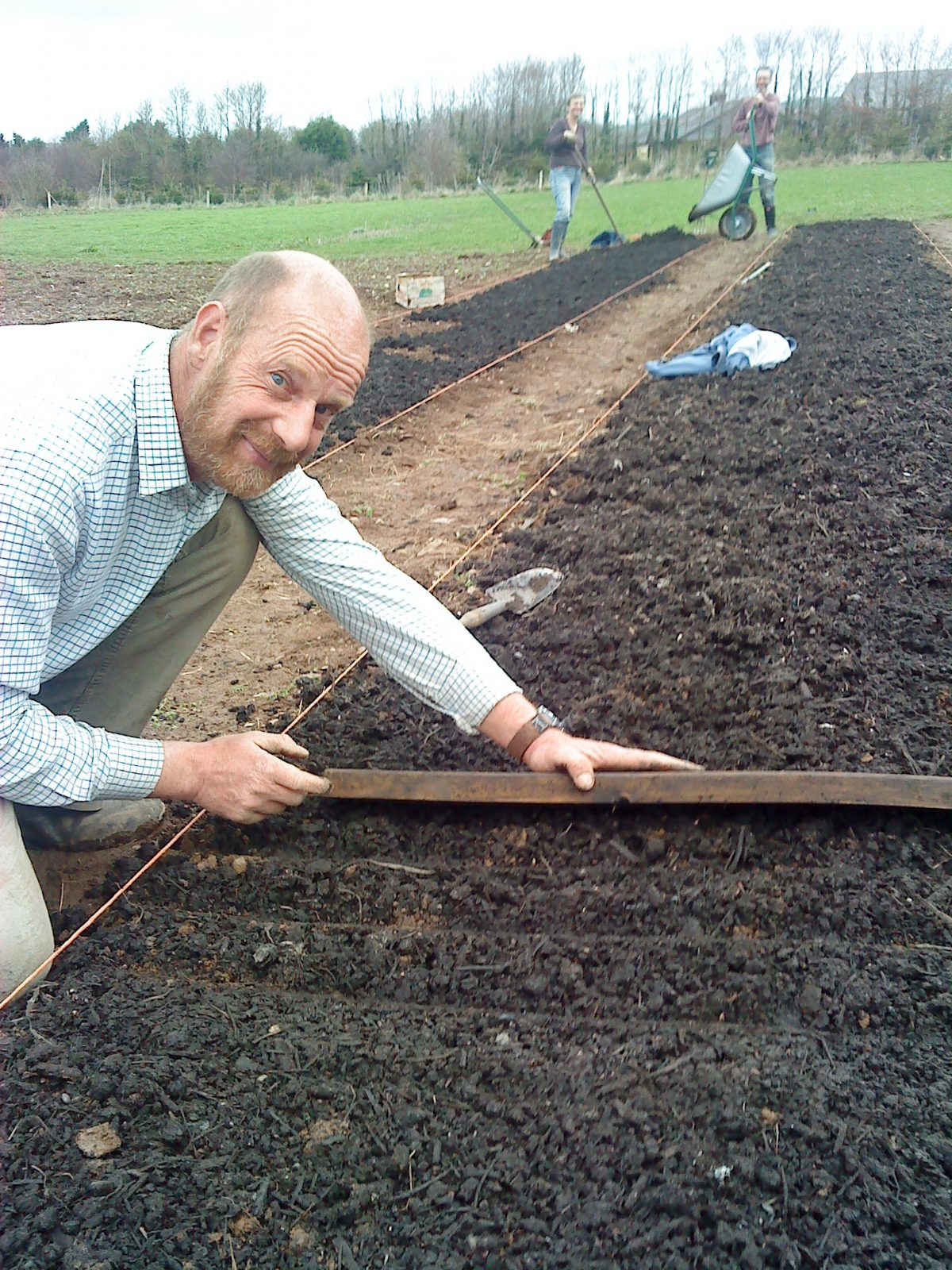
April 3, 2010
The next volunteer growing session is on Sunday 11 April. We’ve decided to give everyone a rest this Easter Sunday.
We do need all the help we can get to plant veg at this time of year so please consider coming along for a couple of hours next Sunday between 10am and 12 noon.
You’ll be made very welcome. We can guarantee you unlimited fresh air, plenty of exercise and some friendly company… PLUS you’ll come away feeling you’ve achieved something worthwhile.
Expert grower Mark Norman says:
“A small gang of us created a new growing bed, spread compost, and sowed lettuce and beetroot Detroit last week. But we really could have done with some extra assistance.
On Sunday 11 April there’ll be broad beans and celery to plant out, and more beetroot plus parsnip to sow. Also compost to spread and additional growing beds to prepare. Please bring tools – hoes, spades, forks, trowels, rakes, wheelbarrows…”
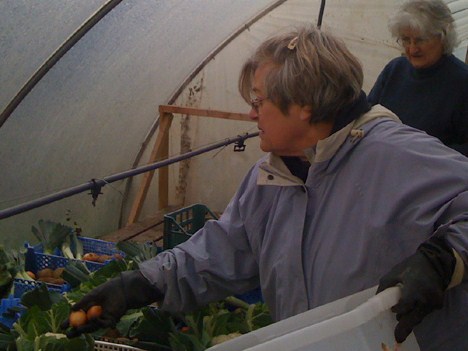
March 27, 2010
Our picking and packing volunteers urgently need shelter from the Cornish wind and rain.
Each week they prepare around 30 vegetable boxes for Camel CSA members on Friday mornings. Last summer we were blessed with blue skies and warm sunshine nearly every Friday, but come the autumn it was a different story.
Over the winter we’ve been borrowing one end of a polytunnel from Jeremy Brown, one of our expert growers. But now the growing season has begun he needs it to cultivate vegetables for his business at St Kew Harvest Farm Shop.
We’re looking for a second-hand shed that’s at least 4m x5m in size. Ideally it would have a roof overhang or a verandah. We’re also on the look-out for an unwanted polytunnel that’s a minimum of 7m long and 4m wide. Just a frame for a tunnel would be a great help. We’ll pay, of course.
If you know anyone who might be able to help, please get in touch with us.
Members of the volunteer growing team will be flexing their muscles this Sunday morning digging up dockleaves, spreading compost and preparing more vegetable beds. Beetroot and lettuce seeds also need sowing.
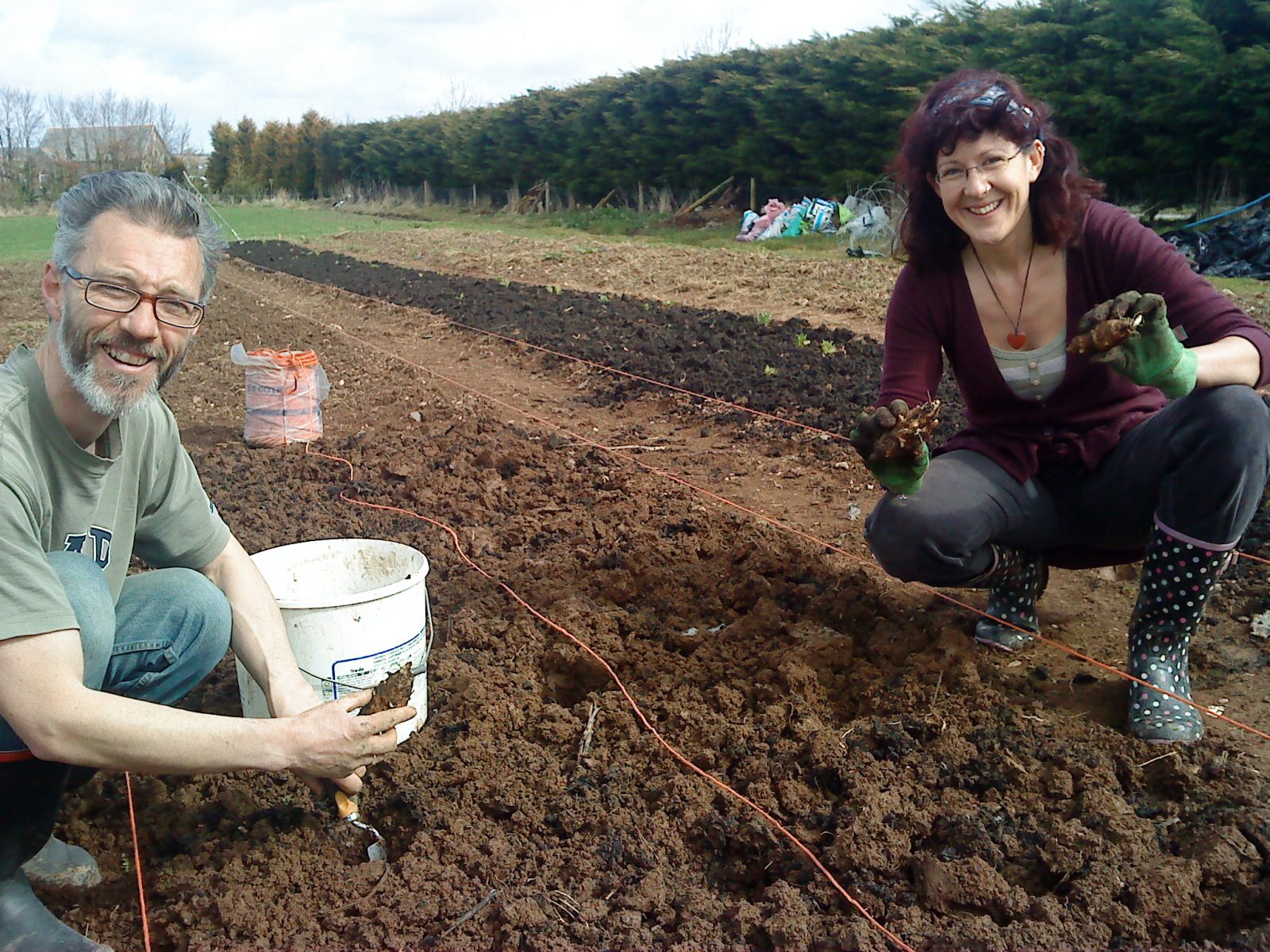
March 22, 2010
It’s all a bit nerve-racking. We’ll hear soon whether we’re going to get funding to help widen our activities.
A Lottery Food Fund assessor came for a site visit on Sunday. Kate Harris needed to see for herself exactly who we are and what we get up to. She asked our core group members lots of leading questions and met the volunteer growing team.
Kate watched the volunteers prepare vegetable beds, spread compost, plant Jerusalem artichokes, sow parsley seed for germination in the polytunnel and renew their attack on the dockleaves which are sprouting everywhere in the mild weather.
It’s her job to report back and make a recommendation on our funding bid. The all-important decision will be made in April. It’s a highly competitive scheme, so we reckon we’ve got about a 50% chance – at best.
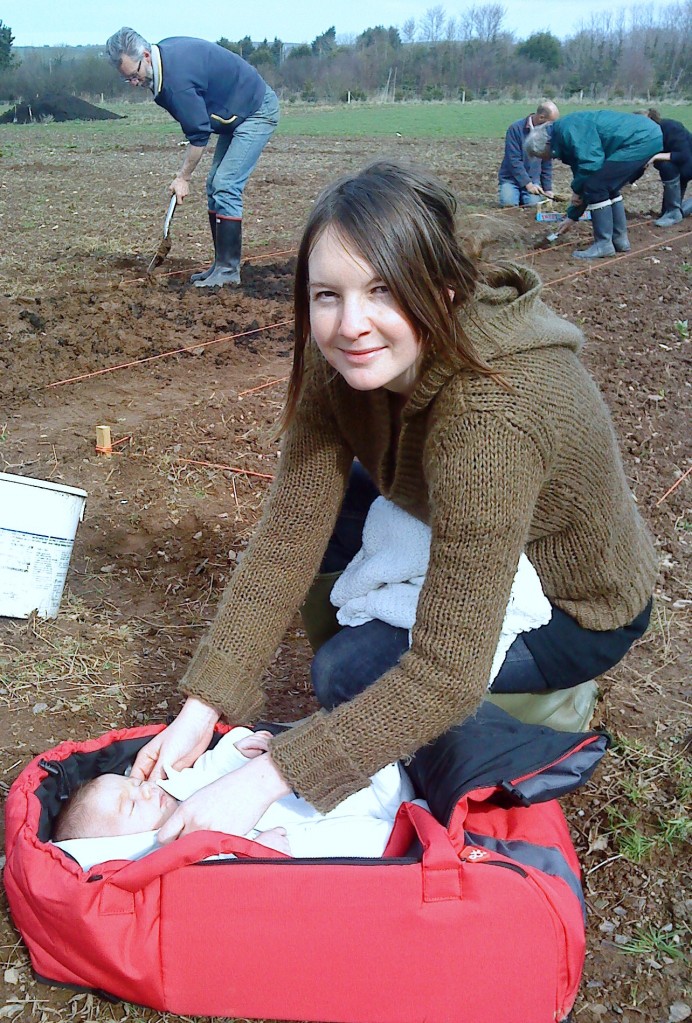
In May we’ll hear whether we’ve been successful in our application for funding from the East Cornwall Local Action Group.
Whatever the result, we’ll keep going as a CSA – growing vegetables, working with the seasons and providing our members with a share of the harvest. It’s just that if our bids are unsuccessful, we’ll have to wait before we can invest in much-needed equipment, set up an education and training programme and provide secure employment.
For the first time on Sunday everyone had the chance to meet Daisy, expert grower Jane Mellowship’s five-week-old daughter. She arrived in a waterproof “baby trug” – ideal in the circumstances!
Many thanks to expert grower Mark Norman and volunteers Cath, Charlotte, Danny, Frank, Kitty, Mark M, Mike H, Mike S and Robert.
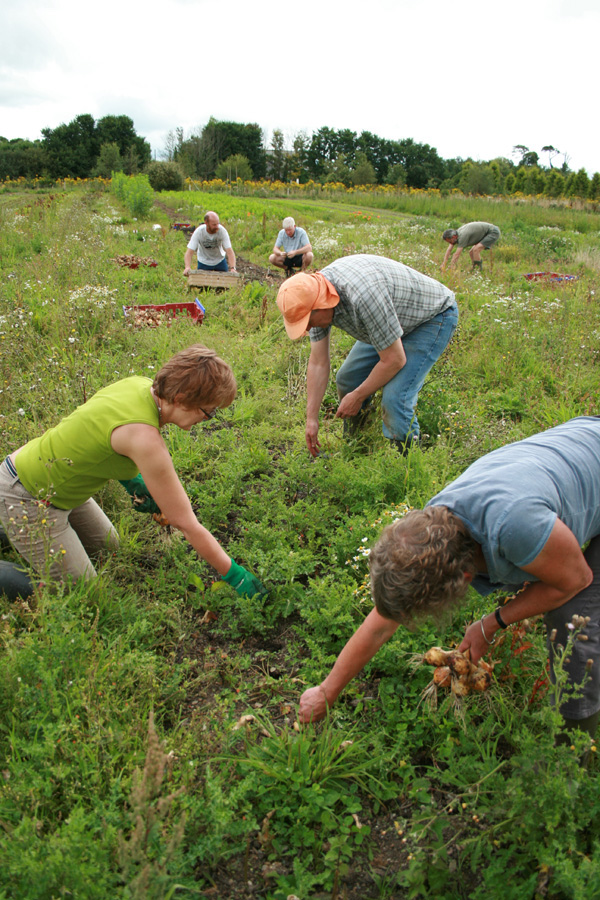
March 8, 2010
The local food movement is too fragmented and can only work if the government puts its full weight behind it. So Professor Kevin Morgan of Cardiff University, told guests at the Growing Collaboration event at the Eden Project in Cornwall.
The “quiet revolution” against our industrialised food system is helping more people to understand where their food comes from and how it’s produced.
But action is needed at the centre to counteract the hidden health, environmental and economic costs of our cheap food culture, said Professor Morgan, a member of the Food Ethics Council:
“Nothing helps people to reconnect more than food. Locally, sustainably-produced food is absolutely essential.
The biggest weakness of our local food movement is fragmentation and localisation. It can’t do anything until central government acts in a more strategic way. The government has to get its act together to be more supportive.”
The Growing Collaboration conference was organised by Eatsome, an NHS-funded project which aims to improve healthy eating in Cornwall. The event enabled people who grow, prepare and eat food in a sustainable way to get together, share their experience and strengthen contact.
The fragmented nature of Cornwall’s own local food projects became evident during the three-minute “soap box” slot at the conference, when we all had a chance to explain what we’re doing.
Here’s a selection: –
- Camel Community Supported Agriculture – that’s us, of course
- Bugle Greenspace – its Growing Together project aims to link owners of unused gardens and greenhouses with other local people who would like to grow their own but don’t have a growing space
- Trevalon Organic Vegetables – established organic veg box scheme and online shop near Liskeard supplying local businesses. In the process of setting up a Community Supported Agriculture Scheme
- Chyan Community Field – volunteers around Penryn are developing allotments, pond, strawbale tea-shed and toolstore, sensory garden, composting area, covered cob seat, playground and community orchard
- Seeds, Soup and Sarnies – providing families in St Blazey and Treverbyn parishes and parts of St Austell with the chance to share gardening skills and favourite recipes
- Cornish Guild of Smallholders – Lostwithiel Local Produce Market, Taste Cornwall community shop in Liskeard, annual show
- Transition Cornwall Network – supporting Transition groups throughout Cornwall move towards a positive, resilient, low carbon future
- Soil Association – helping to develop community supported agriculture projects in partnership with Making Local Food Work
- Cornwall Neighbourhoods for Change (CN4C) – its Growing Food at Home programme aims to make home-grown food more accessible. Works with Cornwall Waste Action‘s compost project
- Healthy Early Years (HEY) – “nipper nutrition” project aimed at nurseries
- The Big Lunch – annual Eden Project initiative to get people out on their street, raise a glass and share food with their neighbours
- Penair School chef – unorthodox and award-winning approach to school dinners in Cornwall
- Cornwall Food Programme – addressing the local food supply needs of the NHS in Cornwall
- Cornwall Healthier Eating and Food Safety Awards (CHEFS) – award scheme for restaurants and cafes
- Cornwall Agri-food Council – aims to “transform Cornwall into the UK’s exemplar agri-food centre of excellence”
- Somerset Land & Food – developing a digital tool to map food projects in the south west
It should now be clear why we all need to be working together in a much more organised way!
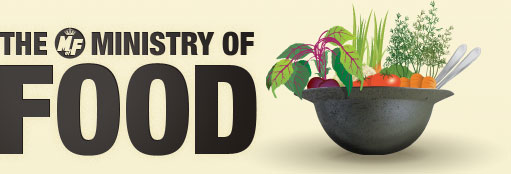
March 1, 2010
The days of food rationing may be long over but the need to alter our eating habits is as important as ever. This became clear on my recent visit to – of all places – the Imperial War Museum in London.
Its Ministry of Food exhibition reveals some fascinating parallels between the dig for victory campaign in the Second World War and the enthusiasm that we all now share for growing our own food.
It shows that eating seasonal fruit and vegetables, healthy nutrition, recycling and reducing imports were just as important in 1940 as they are today.
But for very different reasons 70 years ago, of course.
Back then as now, people queued up for allotments and pledged to grow fruit and vegetables at work and in their gardens. They learned all about crop rotation, the value of nutritious green manure and how to create rich, sweet-smelling compost. They clubbed together to raise pigs, poultry and rabbits.

By 1943, more than six million British families were growing their own veg. The number of allotments had doubled to 1.75 million compared to 850,000 in 1939. Potatoes – led by cheery icon Potato Pete – replaced imported wheat as a staple of the wartime diet because they were full of vitamin C, easy to grow, cheap, filling and energy-rich.
A vegetable list to provide “winter meals from a well-planned plot” itemised potatoes, cabbage, sprouting broccoli, carrots, onions, shallots, beetroot, swede, brussels sprouts, parsnips, leeks, kale, savoy cabbage, spinach beet and turnip.
Unsurprisingly, it mirrors the contents of Camel Community Supported Agriculture’s own seasonal weekly veg boxes being handed out to our members during the winter months.
The only difference is, thanks largely to multicultural influences, that our seasonal recipes are much more tasty and adventurous!
The Ministry of Food exhibition runs at the Imperial War Museum in London until 3 January 2011. It’s sponsored by Company of Cooks.

January 24, 2010
What a relief to see snowdrops emerging in the woods between St Mabyn and St Kew Highway.
The ground is far too cold and saturated with melted ice and snow for us to start work yet on Camel Community Supported Agriculture’s vegetable plot.
Once the earth warms up in late February / early March our volunteer growing team can begin preparing the ground, spreading compost and planting seed into cells to go in the polytunnel.
In the meantime we’re continuing to harvest our own parsnips, Jerusalem artichokes and carrots as well as the remaining onions and shallots in store. The rest of the weekly veg box contents are being sourced locally from growers in the immediate area.
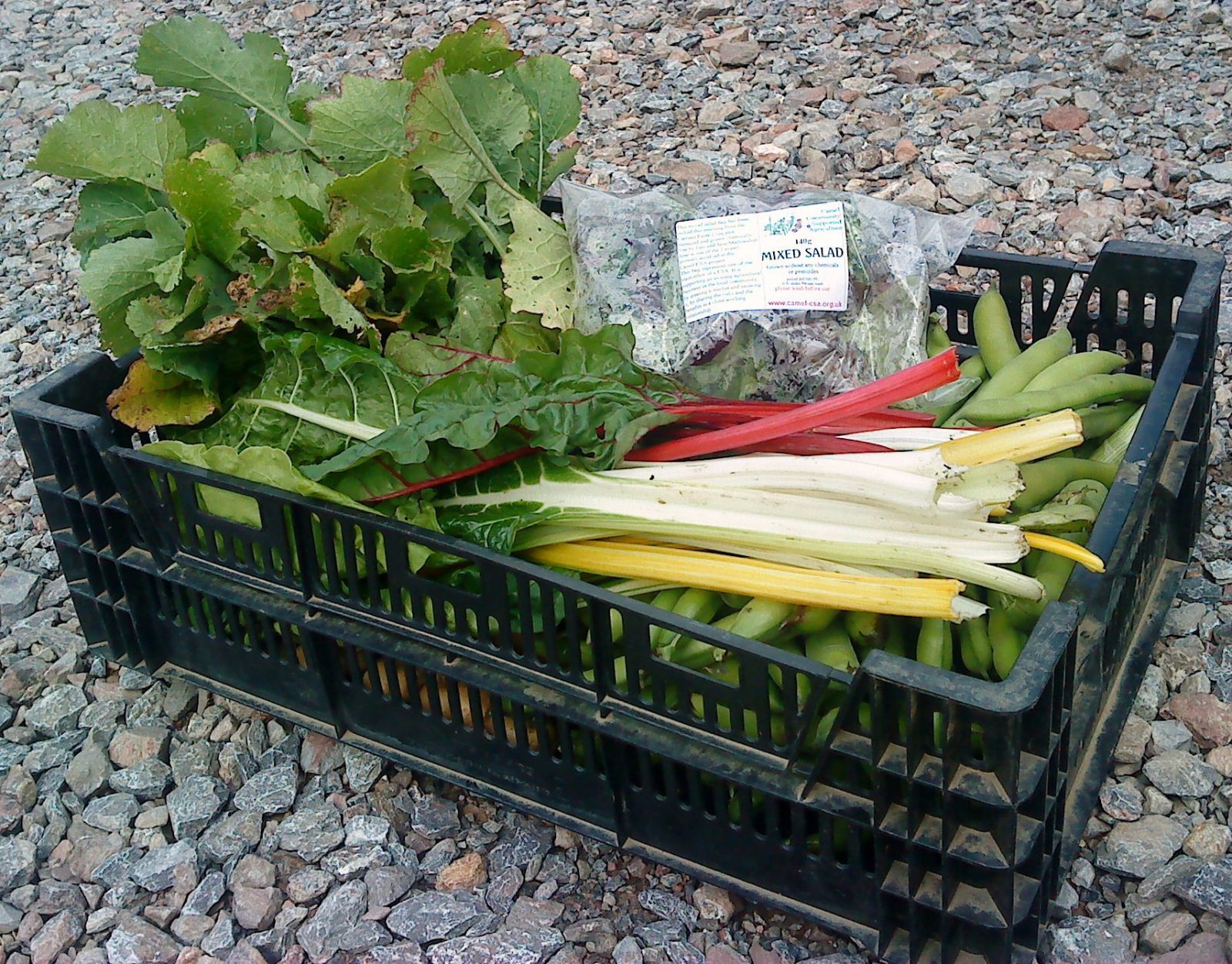
July 5, 2009
Above is our first standard veg box.
We’ve had an enthusiastic response from our members to Camel Community Supported Agriculture’s first vegetable boxes. This is despite some teething problems with distribution.
Tony says:
“The box looks fantastic! We’re looking forward to next week’s already.”
John and Cathy are delighted with the quality:
“The cucumber which was sweet and fresh and the lettuce and onion we used in a salad.”
They like the wide and interesting variety of vegetables and have found new ways of using them:
“The beet greens we cooked almost like a spinach or spring greens and had with fish – better than spinach – along with broad beans and potatoes.
The beets will be roasted and eaten with a lamb casserole with the rest of the onion, turnips and courgettes and we will try your broad bean soup. Nothing wasted.”
In the end, both small and standard boxes contained potatoes, broad beans, beetroot, turnip, cucumber and onions. Standard boxes had a salad pack and small boxes a lollo rosso lettuce. In addition, standard boxes contained Swiss chard and courgettes. There wasn’t enough time to pick parsley.
We have a glut of broad beans, so each box was given an extra £4-worth at shop prices! We don’t yet have our own poly tunnel, so our three expert growers – Jane, Jeremy and Mark – supplied the salad bags, lettuce, courgettes and cucumber.
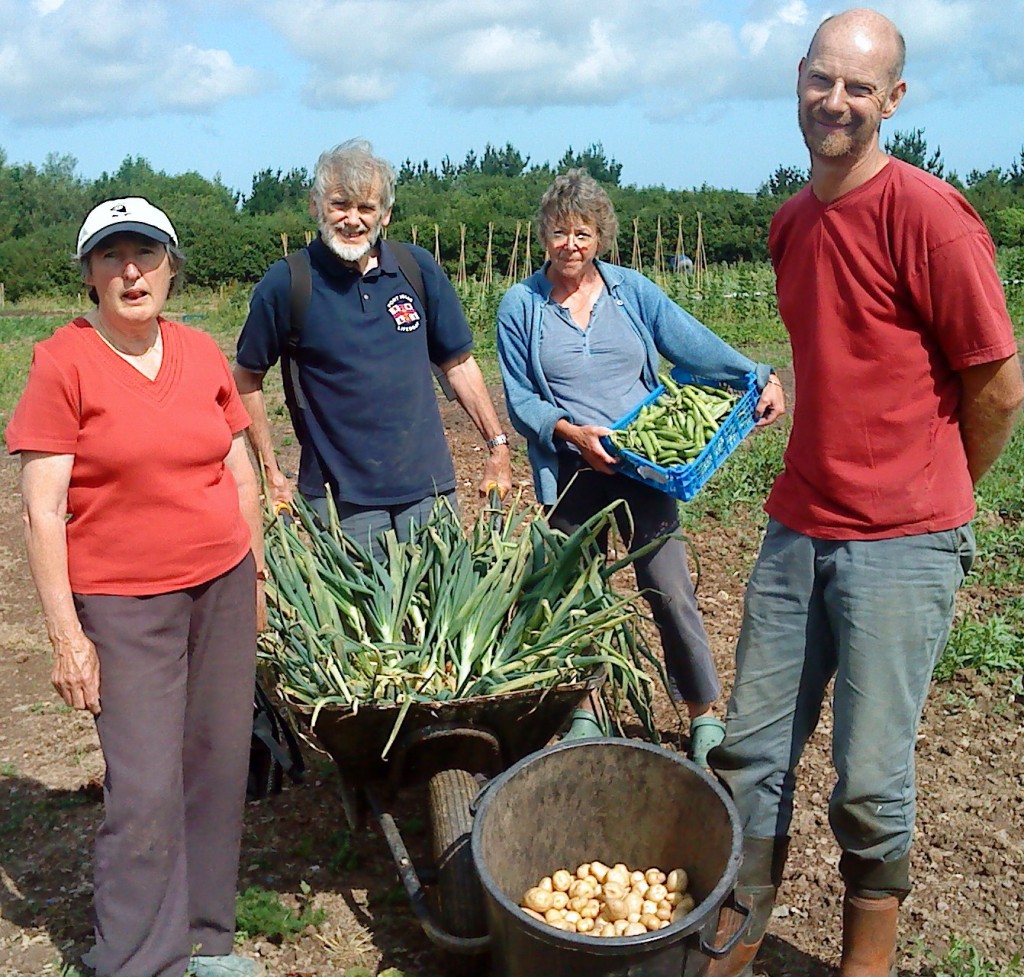
New team
Grateful thanks to our volunteer picking and packing team of expert grower Mark Norman, Mike H, Penny, Robert and Trish. Mark says:
” It’s great to see some new faces. I hope the boxes going out means that we’ll see even more volunteers next week.
As first boxes they are excellent. I hope we can keep the variety going.”
If you would like to volunteer, either picking and packing or planting and cultivating, just turn up on a Friday or Sunday between 10 a.m. and 12 noon.
Compost bin
This Sunday we constructed a compost bin from wooden pallets lashed together with binder twine. At long last we have somewhere to dump the annual weeds, unwanted plant tops and thinnings.
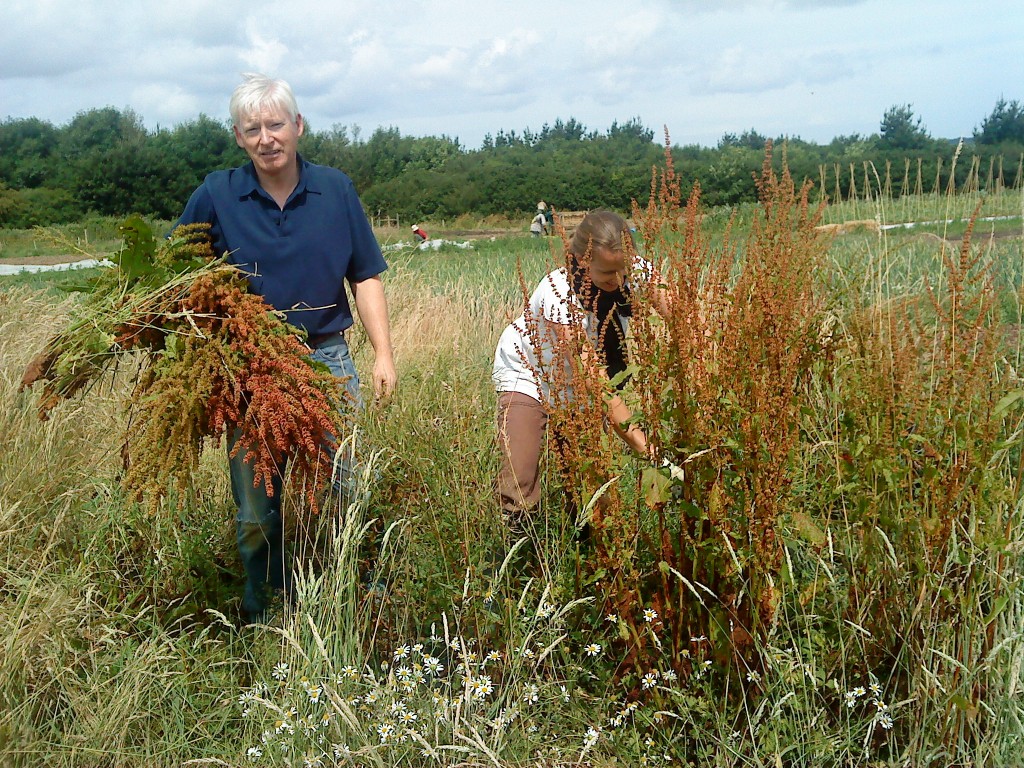
A great deal of effort was devoted to the backbreaking job of cutting down the remaining dock leaves to stop them going to seed and spreading all over the site. We were grateful there were so many of us to share this potentially soul-destroying task!
We weeded the Swiss chard, carrots and brussels sprouts. We planted more radishes to replace the ones which had gone to seed in the hot weather.
A big thank you to expert growers Jane and Mark N and Charlotte, Danny, Ian, Mark M, Mike H, Mike S.
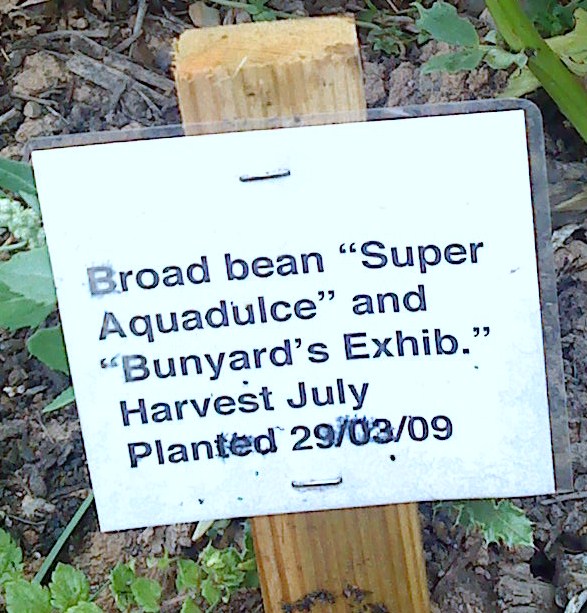
July 2, 2009
We’ve done it – we’re starting to eat our own food!
More than 15 Camel Community Supported Agriculture members receive their first vegetable boxes on Friday 3 July.
A great deal of human effort has gone into providing these first fruits of our labour. It’s hard to believe that we only started preparing our site at the beginning of March and sowed the first seeds just a few weeks later.
Our first share of the harvest will contain: –
- broad beans
- potatoes
- onions
- beetroot
- Swiss chard
- a bunch of curly or flat-leaved parsley
- turnips and radishes – possibly
- green salad
We’ve grown the first eight items ourselves at St Kew Highway. The salad leaves are being provided by Jane Mellowship, one of our expert growers, who has her own vegetable plot at New Polzeath.
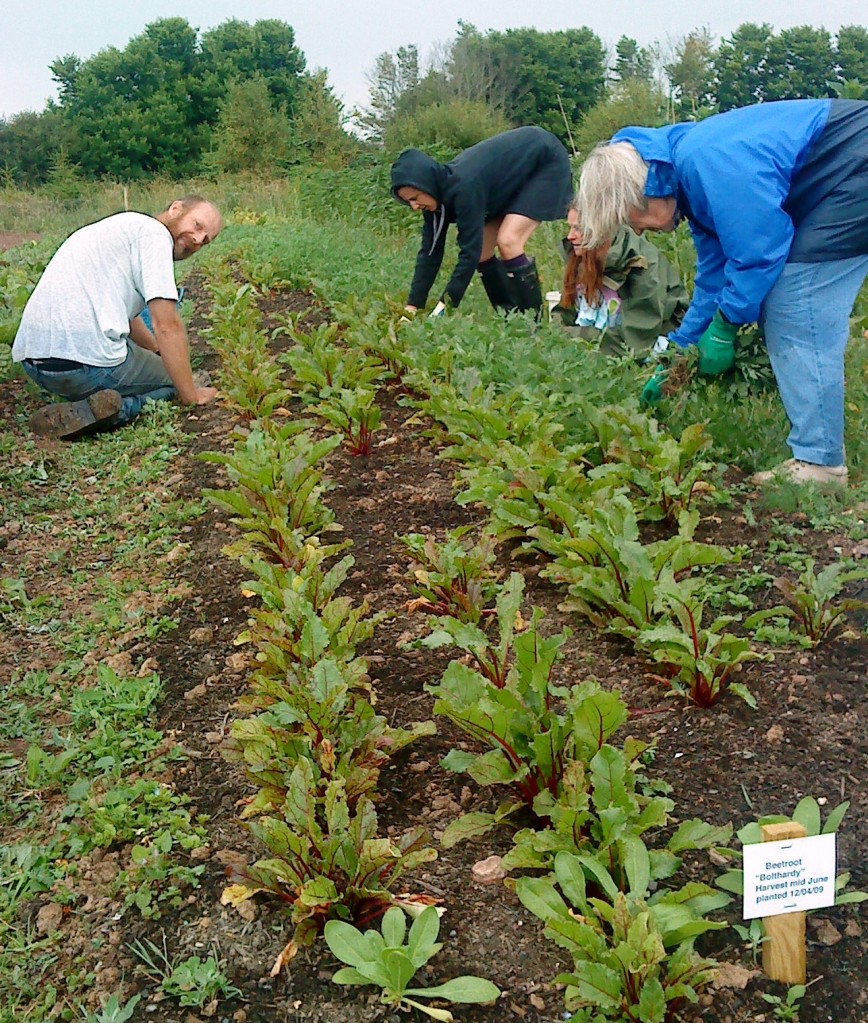
Hard work
We’ve made enormous strides since March – entirely as a result of the dedicated volunteer labour provided by members and expert growers. Some people said we would never manage it, but we have proved that we can.
Many hours of hard work have gone into preparing the 40-metre long growing beds, spreading compost, digging up dock leaves, sowing seeds, planting out seedlings, hoeing and an enormous amount of hand weeding. We’re grateful to our expert growing team and all the volunteers who have turned up on Sunday mornings – rain or shine.
Last Sunday we thinned out and hand weeded the parsnips, weeded the Swiss chard, spread compost and dug up yet more dock leaves that were threatening to go to seed.
A big thanks to expert grower Mark Norman, to members Charlotte, Diana, Mike H and Mike S, and to visitors Donna and Marianne.
Another team of volunteers will be picking and packing the boxes every Friday morning. If you’d like to be included on the rota, please contact Mark Norman or phone Antonina at St Kew Harvest.
Box collection
Members must pay for veg boxes in advance. You’ll be able to collect your box every Friday between noon and 5 p.m. from St Kew Harvest Farm Shop, which is next to the Camel CSA site. Treasurer Cathy Fairman has been co-ordinating box payment and organisation. She says:
“Your name will be on your box, please take your own box and anyone else’s that you are delivering. Remember to give us feedback as soon as possible.
A special thank you to to Penny and Robert Manders and to Mike Haywood for volunteering to help Mark with the first harvest and packing.
Happy eating!”
Feedback on box content and any queries about veg box administration should be sent to Cathy at thefarm@bodminmoor.co.uk
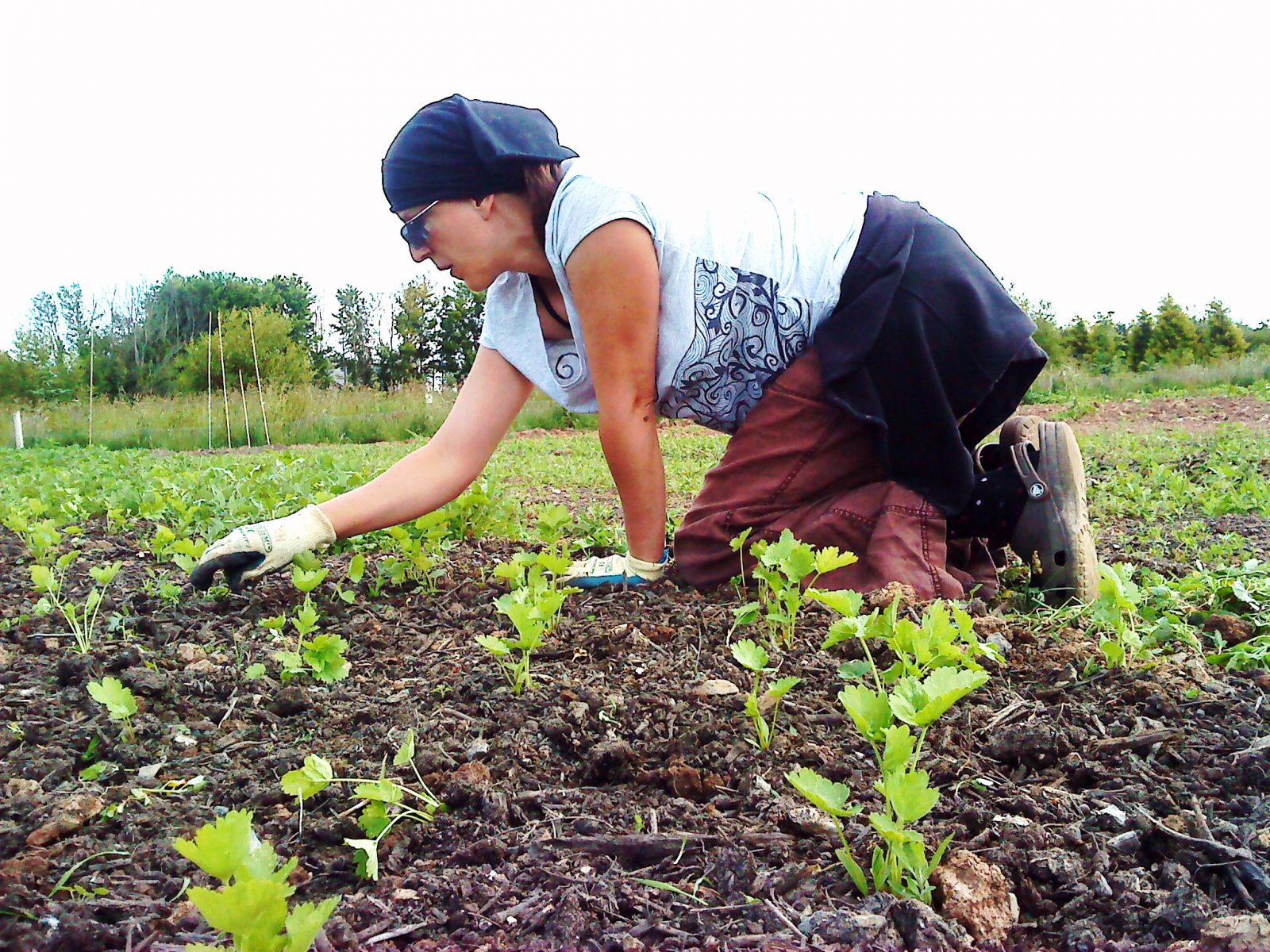
June 24, 2009
It’s that moment we’ve all been waiting for! We’re about to harvest some of our own food.
Camel Community Supported Agriculture’s first vegetable boxes will be ready on Friday 3 July. Any member who would like to share in the harvest should contact our treasurer Cathy Fairman as soon as possible.
The first boxes have been allocated to members who have paid in advance. They will be ready to collect on Friday 3 July from St Kew Harvest Farm Shop at any time between 12 noon and 5 p.m. Cathy says:
“We are all hoping that these boxes will meet expectations. Please, please, if for any reason you are not totally happy let us know. We really want to get this right so your input is crucial.”
We also need volunteers to pick vegetables and pack the boxes. Cathy adds:
“We will be picking and packing the vegetables on Friday mornings. Times will vary and we would like to form a rota of volunteers to help the growers in this. Any members who would be able to help please let me know.”
Volunteer growers
If any members would like to help on the site at St Kew Highway outside the normal volunteer times on Thursday and Sunday mornings, please contact expert grower Jeremy Brown on 07971762227 or phone St Kew Harvest Farm Shop on 01208 841818. There’s lots to do as usual!
Last Sunday we constructed more growing beds, spread compost, sowed extra carrots, did loads of hand weeding, spread concentrated chicken manure on the potatoes and dug up scores of dock leaves that were threatening to go to seed.
Many thanks to expert growers Jane and Jeremy B and to volunteer members Carolyn, Cath, Charlotte, Diana, Mark M and Mike S.


